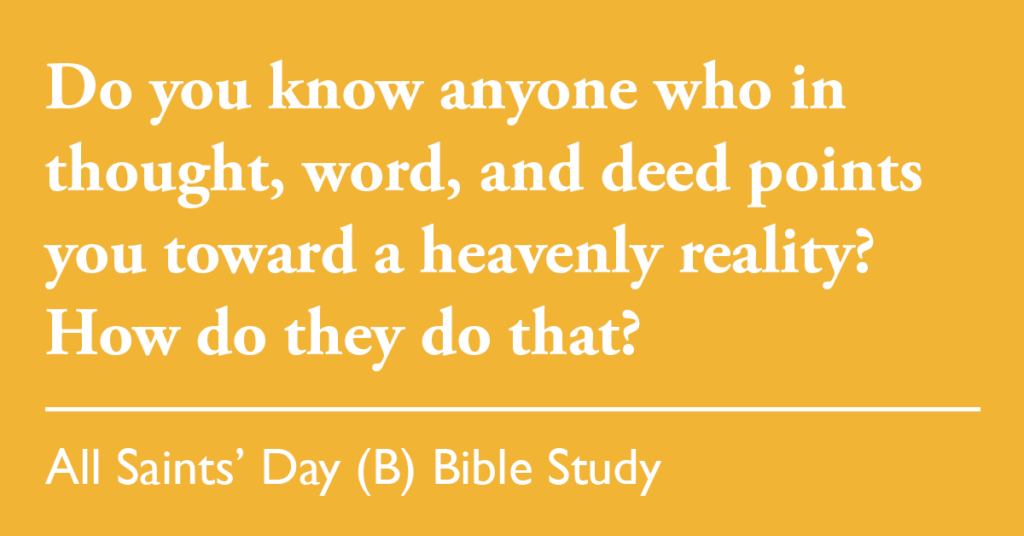Bible Study: All Saints’ Day (B), tr. – November 3, 2024
November 03, 2024
RCL: Wisdom of Solomon 3:1-9 or Isaiah 25:6-9; Psalm 24; Revelation 21:1-6a; John 11:32-44

Wisdom of Solomon 3:1-9
When the Church comes together to celebrate the Feast of All Saints, I often imagine us as a family gathered at the cemetery to honor a cherished relative. Just as on Memorial Day we visit grandpa’s final resting place, on this day we celebrate those whom the Church recognizes as particularly notable examples of life in Christ. If on this holy day we gather at the grave of the saints at rest, then this reading from the wisdom literature is the epitaph on the headstone that lies before us. Contained within it is our Christian hope. The hope of eternal life stretches back even to the forebears of our Christian tradition, and for centuries that promise has been inscribed in our most sacred texts. It is such a promise that beckons us to this holy occasion.
- What particular saints have influenced your Christian experience?
- How does this feast connect you with those saints and with the entire communion of saints?
Psalm 24
Today the psalmist’s prayer involves a holy wondering: “Who can ascend the hill of the Lord? And who can stand in his holy place?” One answer is immediately given: “Those who have clean hands and a pure heart, who have not pledged themselves to falsehood, nor sworn by what is a fraud.” It’s easy to see why we read this on All Saints’. These with clean hands and pure hearts are the very saints of our tradition. These are they who have been blessed by the Lord and received their reward at the saving hands of God. The saints remain our blessed models for life on earth, but they are also our advocates in heaven. The opening lines of this psalm remind us that God created the earth, but remember that Genesis tells us that God created the heavens as well. The saints remain examples for us on earth as they dwell in heaven with the God who is the source of both our existence and our final reward, our present reality and our salvation.
- How do the saints connect us not only to an earthy model of life in Christ, but also to a heavenly one?
- Do you know anyone who in thought, word, and deed points you toward a heavenly reality? How do they do that?
Revelation 21:1-6a
This passage encourages us, as the book of Revelation so often does, to use our imaginations in ways that might be foreign to us. After all, imagination is not just kids’ stuff! Amidst what can be the dullness of our daily lives, we often let practicalities rule our hearts, but for the writer of this text, imagination is a blessed escape. Belief in the New Jerusalem was widespread in biblical times. As one who was experiencing the atrocities of Roman rule, the writer likely had no another outlet to process the pains of an oppressed life. By entering the world of the writer’s imagination, we not only catch a glimpse of the writer’s imaginative escape—a heavenly city descending from above—but we are reminded of the importance of our own images for a better future. These images might consist of a renewed commitment to civil discourse in our country, a world without homelessness, or a society with affordable health care for all people. But our imaginations are not just limited to the things of this world; they can also explore the world to come. So linger in your imagination with this passage and with the communion of saints wondering about a promise that is, at least to us, yet to be revealed.
- Do you ever use your imagination? How does it increase your faith?
- Although we may not be oppressed in the same ways as our ancient counterparts, how can faithful imagination be a healthy escape for our daily struggles?
John 11:32-44
Jesus is moved to tears. In a display of his full humanity, Jesus grieves the loss of his friend, Lazarus. To make matters worse, in the middle of his grief, Jesus is flooded with questions, perhaps accusations, that he could have saved him. That has to hurt. Jesus proceeds, still deeply grieved, to resurrect Lazarus and in so doing renews the faith of Mary, Martha, and the other members of the crowd. The passage is especially pertinent at the celebration of All Saints’ not because it deals with death, but because it is a passage that epitomizes eternal life, the promise that God has made through Christ to each of us. Jesus says, “Did I not tell you that if you believed, you would see the glory of God?” The faith of Jesus’ followers was rewarded in this miraculous event. We may never have seen anyone raised from the dead, but there are other ways that we experience the glory of God: a child’s birth and baptism, the unconditional love of our families, friends, and neighbors, and most of all, through participation in the Eucharist.
- When has God’s glory been revealed to you? Was it a large “aha” moment or a still, small whisper in the night?
- How is God’s glory manifested in the remembrance of the lives of the saints? How do you know?
This Bible study was written by the Rev. Warren Thomas Swenson for All Saints’ Day (B) in 2018.
¡No olvide suscribirse al podcast Sermons That Work para escuchar este sermón y más en su aplicación de podcasting favorita! Las grabaciones se publican el jueves antes de cada fecha litúrgica.


